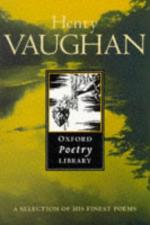|
This section contains 2,434 words (approx. 9 pages at 300 words per page) |

|
SOURCE: "Henry Vaughan," in The Demon of the Absolute, Princeton University Press, 1928, pp. 143-64.
More was an American critic who, along with Irving Babbitt, formulated the doctrines of New Humanism in early twentieth-century American thought. The New Humanists were strict moralists who adhered to traditional conservative values in reaction to an age of scientific and artistic self-expression. In regard to literature, they believed a work's implicit reflection of support for the classic ethical norms to be of as much importance as its aesthetic qualities. In the following excerpt from an essay originally published in the Nation in 1916, More celebrates Vaughan's achievement as a poet of bittersweet spiritual longing in a fallen world.
There are poets who, by virtue of some affinity of spirit with our own, appeal to us with an intimacy that takes our judgement captive; we go to them in secret, so to speak, and love...
|
This section contains 2,434 words (approx. 9 pages at 300 words per page) |

|


